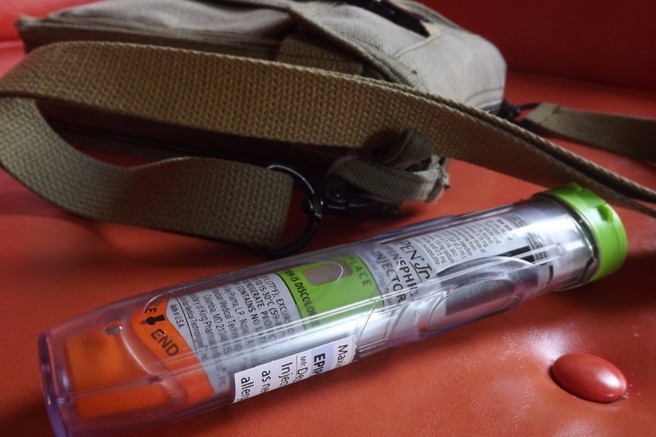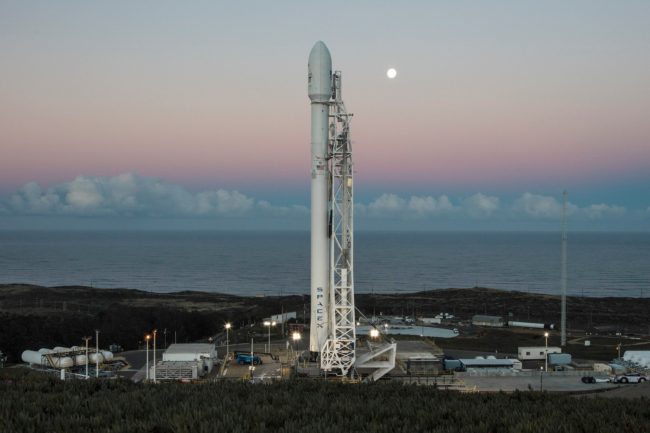A Falcon 9 at Vandenburg AFB in the wee hours of Saturday morning | Photo: SpaceX, CC0
Today we’ve got a bunch of good news: SpaceX returns to flight, a generic EpiPen on the cheap, and a few stories about the ongoing electric car revolution! It’s our weekly roundup.
RTF!!
SpaceX successfully returned to flight yesterday with the launch of ten Iridium satellites into orbit from its Vandenburg AFB-based launch site in California. Everything went according to plan the first time around, which was a must since the launch window was only one second long (otherwise known as an “instantaneous” launch window). The weather was absolutely perfect, which among other things meant that the live camera feed from the returning first stage held through the entire landing, allowing viewers to get a real-time first-person view of the boostback, re-entry, and landing burns from the point-of-view of the rocket itself. The first stage landed on the Pacific-based drone ship Just Read The Instructions, making it not only the return to flight, the third flight from Vandenburg, and the thirtieth flight of the Falcon 9 to orbit, but also the first successful landing on Just Read The Instructions. The ten satellites will form part of a global communications network that (among other things) serves first responders worldwide, aiding their efforts to get rescue and aid to the victims of natural and manmade disasters in places where infrastructure is lacking or destroyed. You can read about the Iridium Next constellation over at Wikipedia.
SpaceX is also making plans for the first launch of the Falcon Heavy this year, with the completion and submission of an environmental assessment, necessary to build two additional landing pads at Landing Zone 1 on Cape Canaveral in Florida. The plan is to have all of the three Falcon 9 cores that will power the Falcon Heavy turn around and land for reuse. If the construction of the landing pads isn’t give the go-ahead, SpaceX say it’ll still land the cores — just that two of them will land on autonomous drone ships out at sea. You can read more about the report and its implications over at Ars Technica.

Goodbye EpiPen, Hello Generic Adrenaclick
Back in 2007, the pharmaceutical company Mylan bought the rights to the epinephrine auto-injector known as the EpiPen, used to treat the severe allergic reaction known as anaphylaxis. Since that time, the price for a two pack of the life-saving emergency medication has soared to roughly $600 for a two-pack, and Mylan’s introduction of a $300 off coupon (for qualifying individuals) amid public outcry has rung a little hollow. All of which makes the latest news music to people’s ears: pharmacy chain CVS announced this week that it has partnered with Impax Laboratories to make a low-cost generic version of the EpiPen alternative Adrenaclick, which it will sell for roughly $110 for a two-pack. With coupons that bring it down to $10 for qualifying individuals. Yes, you read that right: that’s $55 each instead of $300 each, and $5 each instead of $150 each if you qualify for the coupon. If nothing else, this is testament to the importance of a quick route to generics in the drug patent process. It’s also good news for CVS, who have to fight off competition from other national pharmacy chains in an increasingly competitive market. You can read more on the story over at Ars Technica.

Your Electric Car Future
Despite what you may have heard from a certain someone about how they’re planning to “bring back coal,” the renewables revolution is in progress and is probably unstoppable at this point. Nowhere is this more clear than in the electric car revolution, where, with each passing year, greater advances are made in the speed of recharging and energy capacity of the batteries that power them. Tesla (who’s partnered with Panasonic) announced last week that thanks to its modular design, their still-unfinished Gigafactory is now producing PowerWall and PowerPack 2 batteries at full speed, with the batteries for the much-pre-ordered Model 3 to start production in Q2 2017. By 2018, that single factory will produce nearly the same amount of lithium-ion battery storage as is currently produced by the rest of the world combined. Meanwhile Samsung has revealed a new EV battery platform promising (by 2021) to offer a total driving distance on a charge of 373 miles (600km), with a 20-minute “fast charge” to 80%, or about 300 miles. It’s that fast charging that’s going to be the real driver of EV adoption: once people can get hundreds of miles out of a brief stopover, they’ll feel much less “range anxiety,” which will further fuel the shift away from petroleum-based locomotion. Sooner or later, the electric car future is coming. Here’s hoping it’s soon enough to make a difference.
Oh, and just for the record, if Elon Musk has anything to say about it, the electric car future will also be self-driving. They released the new HW2 Autopilot system just this week.
ICYMI
This week we expanded our team to four (!) bloggers, adding Katelyn Sweigart’s woo-filled Sweigart Report (now with 100% more Sweigart) and Prudence Wyoming’s politisophical PoW posts to Elle’s Feminist Fridays and my sci-tech and skeptical ramblings (and of course the Weekly Roundups). Check it all out for the best in science, technology, skepticism, feminism, and futurism here at This Week In Tomorrow. Here are the links In Case You Missed It.
- On Monday, Katelyn talked colloidal silver in the Sweigart Report
- On Tuesday Prudence introduced herself in a post about dishwashers
- On Wednesday I told you about Bill Nye’s new show (coming to Netflix this spring!)
- On Thursday Prudence talked about the value of the rural west, and
- On Friday Elle talked police brutality and racial politics
Best of the Rest
But of course there’s always more stories than we can get to in the week, so as always, here’s your weekly linkspam.
- A study (shockingly!) found free birth control significantly decreases abortion numbers
- The EPA accused Fiat Chrysler of the same eco-screwing shenanigans that VW got up to
- Bad news for the US’s future cybersecurity because Trump
- Bad news for the US’s climate policy because Trump
- But Massachusetts is forcing Exxon to hand over decades of documents about its opinions on climate change, and
- At least you might be able to buy a foldable smartphone in 2017, so there’s that
I’ll leave you with a new video from The Slingshot Channel, in which the crazy builder of All Things Projectile makes an automatic crossbow, powered by an electric drill.
Have a great week.
***
That’s all for today folks, thanks for reading! Except for the very *very* occasional tip (we take Venmo now!), we only get paid in my own (and your) enthusiasm, so please like This Week In Tomorrow on Facebook, follow me on Twitter @TWITomorrow, and tell your friends about the site!
If you like our posts and want to support our site, please share it with others, on Facebook, Twitter, Reddit — anywhere you think people might want to read what we’ve written. If there’s something you think we’ve missed or a story you’d like to see covered, drop us a line! Thanks so much for reading, and have a great week.
***
Richard Ford Burley is a human, writer, and doctoral candidate at Boston College, as well as Deputy Managing Editor at Ledger, the first academic journal devoted to Bitcoin and other cryptocurrencies. In his spare time he writes about science, skepticism, feminism, and futurism here at This Week In Tomorrow.

